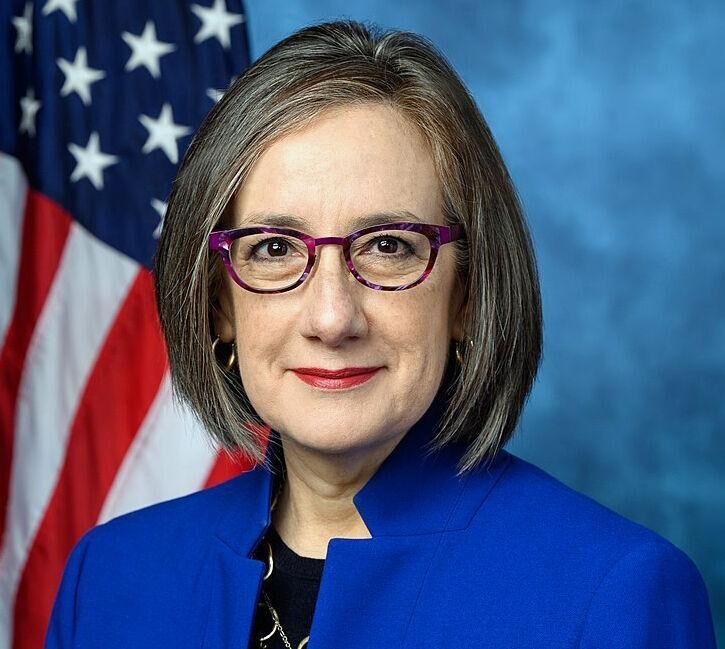Rep. Salinas seeks more federal help for Oregon farmers
Published 10:36 am Tuesday, September 12, 2023

- Congresswoman Andrea Salinas, Congressional District 6,
Democrat Andrea Salinas says she is using her committee assignments as a first-term member of the U.S. House — and her experience as a congressional aide and state representative — to shape legislation to benefit Oregon’s new 6th District.
On the House Agriculture Committee, an assignment she shares with Republican Lori Chavez-DeRemer — also a first-term member from the adjacent 5th District — Salinas says more federal protections should be extended to the specialty-crop producers that constitute the bulk of Oregon’s agriculture.
“They don’t necessarily want the federal government coming in with a blank check,” she said.
“But they want to know that when disaster strikes — and we have been seeing disasters in Oregon — and times get tough, they do have a safety net and the federal government can help them out with resources available for them to use and they’re not cast aside.”
Salinas discussed her first year at a Sept. 8 luncheon of the Salem City Club.
Oregon gained a sixth House seat as a result of the 2020 Census, and Salinas was elected in 2022. The 6th takes in a small part of Clackamas County, the southeast suburbs of Washington County, and the more populous areas of Marion County — including Salem and Woodburn — plus Polk and Yamhill counties.
She and DeRemer are the first Latina members of Congress from Oregon.
Federal farm legislation is up for renewal. Congress passed the most recent bill in 2018.
Salinas and Chavez-DeRemer were able to get the House committee to conduct a meeting in Oregon, where plant nurseries accounted for a leading $1.9 billion in agricultural value in 2020, according to the Oregon Department of Agriculture. But federal crop insurance is largely oriented to commodities such as wheat — which in Oregon ranked sixth at $274 million — and 89% of the money goes to about 150,000 large farms. The remaining 11% is available to the other 2 million farms nationwide.
“If that sounds unfair to you, it’s because it is. That is why one of my first tasks is to make sure I’m working hard to make sure Oregon’s interests are represented in this year’s farm bill,” Salinas said. “Congress has not prioritized their needs in the farm bill. The current crop insurance system is indicative of this. It’s causing real harm to some of our small farmers in Oregon.”
The concerns raised by Salinas and Chavez-DeRemer are not new.
When he was on the same committee during some of his 14 years in the House, Democrat Kurt Schrader of Canby — himself a farmer — voiced similar criticisms. Democrat Earl Blumenauer of Portland, whose 3rd District now includes Hood River County, has offered legislation that would reorient the direction of federal farm supports away from traditional commodities such as corn, cotton, soybeans and wheat.
Salinas was a district aide for U.S. Rep. Darlene Hooley, a Democrat from West Linn who held the 5th District seat from 1997 until 2009. She also was an aide for Nevada Sen. Harry Reid and California Rep. Pete Stark.
A broader reach
Federal support for agriculture is not the only topic covered by farm legislation. The Department of Agriculture also administers the Supplemental Nutrition Assistance Program (SNAP), once known as food stamps, though Oregon and other states converted to electronic benefits decades ago.
About 730,000 Oregonians — one of every six — rely on food benefits. Of that total, Salinas said, 42% are families where at least one person works, and 41% are older people or people with disabilities who are not expected to work full time.
Before she spoke at the Salem City Club, Salinas attended a meeting where concerns about SNAP were voiced. Pandemic-era benefits ended earlier this year, resulting in reductions for many households, and work requirements were instituted for some recipients. President Joe Biden agreed to them as part of the bipartisan deal that allowed the federal debt ceiling to go up for the next two years.
Salinas said that increased food costs and reduced benefits affected those households as much as higher costs of housing, child care and health care.
“We are talking about families who are working but struggling,” she said.
Salinas also wants to remove a bureaucratic obstacle that makes it harder for Job Corps enrollees, typically between ages 18 and 24, to undergo wildfire training by the Forest Service — an agency within the USDA. The Job Corps is under the Department of Labor.
Given that Oregon has seen an annual average of 1,000 wildfires over the past decade, she said, “I am going to fight with everything I can to make sure this provision is included in the farm bill reauthorization.”
Other work
Salinas’s other assignment is to the House Committee on Science, Space and Technology. It’s an assignment she shares with Oregon Rep. Suzanne Bonamici of Beaverton, its second-ranking Democrat. The committee produced much of the framework for the 2022 CHIPS and Science Act, which provides $52 billion in incentives for domestic semiconductor manufacturing, plus $200 billion over a decade for scientific research.
Oregon already ranks third among the states, behind only California and Texas, in its 15% share of the nation’s semiconductor manufacturing workforce at about 40,000 jobs. The largest concentration is in Washington County —home to four plants of California-based Intel — but those jobs extend elsewhere.
“These are good-paying, middle-class jobs in the tech industry,” Salinas said. “I am excited to see how Oregon can play a role in moving our workforce and our young people forward in this area and this type of manufacturing as we repatriate those jobs that moved overseas in the 1990s back to the United States and here in Oregon.”
Although her current committee assignments do not involve health care, Salinas said she remains committed to working on the issue. During her five years in the Oregon House, she led the Health Care Committee in the 2019 session.
Her focus is on mental health, which under a 2008 federal law is supposed to be on par with physical health services. (Oregon enacted a similar law in 2005.)
She said she would press a proposal for three free mental health visits for recipients of two major federal health insurance programs. They are Medicare for people age 65 and older and some people with disabilities, and Medicaid, the joint program with states for low-income people that is known here as the Oregon Health Plan.
“Our system of care should not stop at the neck,” Salinas said, and mental health should be intertwined with hearing, dental and vision care.
“The more the federal government can focus on investments upstream, we can ensure our dollars will have better outcomes.”
She said Oregon’s age-adjusted suicide rate was 5 points above the national average in 2021.
“The more the federal government can focus on investments upstream, we can ensure our dollars will have better outcomes,” she said.





